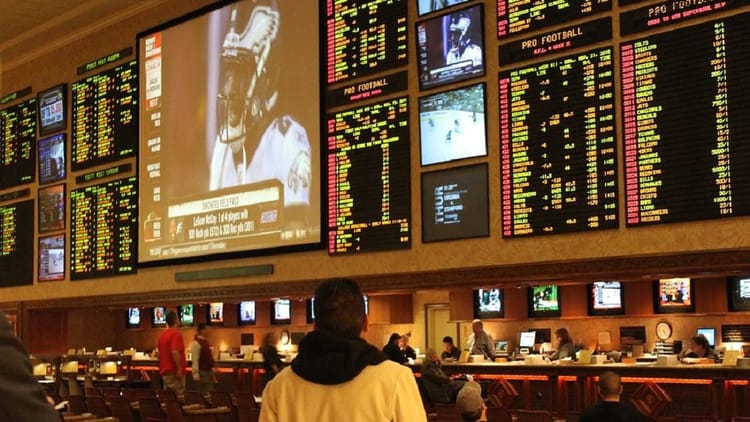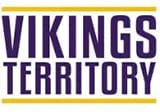The Future of Sports Betting in Minnesota is Up in the Air… What’s Next?

If you’ve spent any time in or around the sports writing world this past year or two you’ll certainly have noticed the effect that sports betting has had on the industry. As the owner of a Vikings news network, I’ve kept an eager eye on the status of a bill in the Minnesota legislature that would’ve legalized sports betting in the land of 10,000 (plus) lakes, as it could’ve changed a lot about how we cover the team. Fortunately or unfortunately, depending on what side of the argument you agree with, the bill authored by Minnesota State Representative Pat Garafolo (R-Farmington), which would’ve legalized sports betting in Minnesota, has apparently stalled after not receiving a single hearing in the Minnesota House last session (although a similar bill in the Minnesota Senate passed the tax committee… Before also stalling).
If you’re new to this, the Supreme Court ruled last year that individual states could determine whether or not to legalize sports betting. That has lead to over ten states legalizing what has been legal in Nevada since the 1950s, giving (some) states a decent low of that sweet sweet tax revenue. Luckily for those in Minnesota looking to (legally) place a bet, our neighbors to the South (in Iowa) recently legalized gambling and even had Vikings legend John Randle on hand to not only celebrate the opening of a new betting book at Diamond Jo Casino (near Northwood, which is about 10 miles south of the border) but by also placing the first bet in the books short history (hopefully on the purple and gold).
“I think 35W is going to be an awfully busy road,” said former Minnesota Viking John Randle, who appeared at the grand opening of the FanDuel Sportsbook in Diamond Jo Casino at noon Thursday.
So what does this mean for those looking to place bets who may have never done so before, and are willing to make the drive to Iowa to do so?
Let’s quickly discuss some beginners notes for those looking to make an already interesting game, even more interesting (feel free to replace the words “interesting” with “heartbreaking”). As we know it’s not just the NFL that people are interested in when it comes to placing bets, but also events like the El Clasico, NBA All-Star Game, and/or the Breeders’ Cup are few of the many well-known events people are waiting to happen each year not only from an entertainment standpoint but also in terms of anticipating the odds and wagering involved.
With the amount of money involved, it’s no surprise that there’s a ton of strategy and analytics available to both those who set the bets/odds as well as those who are placing the bets. In the information age, there’s really no shortage of information, the key question(s) really boils down to determining what information is best and how to analyze that information quickly so you can take advantage of the best odds (as others might follow suit by analyzing the same information, shifting the odds and lowering your expected payout).
The idea is like going into war without knowing how to fight and forgetting to bring armor… Or worse, coming with the knowledge and armor but realizing that you were too late to the party and those who came earlier with said knowledge and armor beat you to the glory. Thanks for hanging in there with that analogy, but some people are just better learners (and writers) when there are visuals involved.
Beyond analytics, long-term success has almost as much to do with your attitude and mindset. If you’re prepared you’re more likely to actually make some money, and while that’s great from a financial standpoint, it’s also important as it creates a positive relationship with sports betting. You’ll not only appreciate betting more, but you’ll look at it more as a game and less as another version of the lottery. Sure, the odds still (typically) benefit the house, but when it comes to sports betting that’s truer in terms of the average or the whole.
Said another way, odds (etc.) are set based on expected betting patterns and expected game outcomes, with the culmination of both typically benefiting the betting houses/books regardless of who wins or loses. That doesn’t mean, though, that a few well informed (and lucky) people can’t end up making some extra cash in the process, as it’s not as much of an odds vs. house situation as… let’s say putting a quarter in a slot machine (which is pre-programmed to only pay out X amount of times vs. all the variables and betting scenarios inherent in today’s sports betting landscape).
Simply put, to be both lucrative and to enjoy sports betting in the long run, individuals should apply the basics of effective betting.
So, what does that mean?
Set Attainable Objectives
Anybody that is relatively familiar with sports (betting) is likely to accurately predict the outcome of a game, at least here and there. However, there’s is a gigantic difference between winning enough to sustain a profit (that begets more betting) and simply getting lucky here and there. The key, then, is obviously figuring out the former, as tricky as that can be.
Despite what I said above about averages, the truth is that because of the analytics and odds being set by the house (and their experts… And artificial intelligence), more people are going to lose than win (otherwise why would these casinos do it?) and to start, one is most likely going to lose than to win.
So, especially to start, setting small attainable goals is important. For example, the first rule of thumb ALWAYS is to bet what you can afford to lose. Beyond that, while you’re getting the hangs of things, concentrate on learning and entertainment as opposed to financial outcomes. Sure, winning helps, but losing can also teach you a lot and especially in today’s complicated betting landscape, there’s a lot to learn and the best way to learn is to simply try until you’ve gained enough experience to start upping your game (and bets).
It may be a slow undertaking, but it is still a moving process, one that should be a reward in and of itself.
Establish A Rational Bankroll Management Plan
Again, wagering what you can afford to lose should always be rule number one. Beyond that, though, especially if/when you start having success, you should still create a bankroll that can absorb losses (but also sustain your ability to bet often and in a variety of ways, if that’s your style). Unfortunately, many sports bettors don’t think about a bankroll management plan until they realize they should’ve had one to begin with, which oftentimes can mean it’s too late.
Beyond the obvious benefits of having a bankroll (plan) is that having said plan enables you to calculate with decent accuracy how much of your roll you should use on each wager/opportunity. Obviously, then, betting your entire roll on one venture isn’t the best use of your money.
Spreading your bets out clearly makes sense as it can soften the blow of an upset loss and while it may make you think that you’re losing out on more winnings, especially to start, the idea is to have fun and not make enough money to retire at 30, so thoughts like that can only lead to trouble. The more varied your bankroll plan, the better your shot at continuing to maintain that roll, which is the point. If you’re looking to change your life through betting, you may end up changing it in a really negative way, which is important to consider (as in, consider both the positive and negative outcomes of a situation).
That also means knowing when to stop via a rational exit plan. Which can be the hardest part of sports betting, as to quote the first ‘Hangover’ movie, “No one walks away when they’re on a heater”. Perhaps that was technically me paraphrasing, but you get the idea. But any casino/betting house wants you to keep betting, regardless, but especially if you’re into them for significant cash (as each bet increases the chances that they’ll “win” their money back). So, STOP.
Keeping Your Composure
It’s human nature to intertwine emotions with most everything we do, especially things we’re passionate about and especially things that involve football (and money). So, perhaps the hardest thing to do when starting out in the sports betting game is to STAY CALM. I’m not sure why I just internet screamed that at you, so perhaps I’m not the best person to be bringing this up.
Part of keeping the discipline is to also ignore, as hard and counter-intuitive as this sounds, team loyalties. That means not betting on the Vikings because of a life-long hope that they’ll win the Super Bowl, but instead solely because you believe they have a significant shot (and good enough odds to make it worth your while). Simply put, that means looking at statistics over … Basically every jersey in your closet.
Takeaway
So, as you can see, sports betting takes a lot of not only homework but self-discipline. Or, it does if you want to actually be successful (and not be just another person visiting Las Vegas who drunkenly put $250 on their hometown team despite the 500-1 odds and third-string quarterback helming their offense).
Considering the length of this piece, perhaps it’s a good thing that Minnesota has pumped the brakes on legalizing sports betting. That should give everyone, including me, enough time to study up and be fully prepared for the inevitable creep of Sports Betting to Minnesota. At least, for the time being, we have Iowa (and the internet, if you’re feeling frisky).
